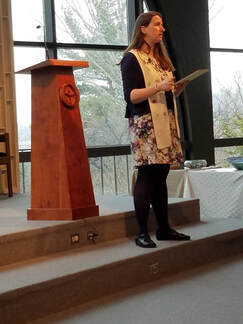Faith & Theology

I believe that religious communities exist to remember the interdependent web. I mean this in two senses, and a hyphen in re-membering may clarify the second sense. Those of us called to lay and professional religious leadership serve the mission of remembering and re-membering the interdependent web.
The first meaning has to do with calling wisdom or information that is known (but may not be immediately accessible) into consciousness or use. That is, remembering is an act of evocation. In ministry and counseling, we celebrate the emotional, spiritual, and intellectual assets already in play and bring those assets into active service through a process of remembering.
The second meaning of “re-member” comes from understanding the word “member” to mean a constituent piece of a larger structure, one part to the whole. To “re-member” is to connect a piece again, to restore a bit of wholeness. One imagines closing a wound, replacing a lost or broken component, or exchanging a maladaptive strategy for a life-affirming one.
Taking these two senses of “remember” together, we lift up the treasures of understanding and functioning that have been available in the past, and we re-weave or knit together the emotional, spiritual, intellectual, and social connections that support abundant life.
My spirituality calls me to connect with—and to help others connect with—legacies of resilience, communities of hope, and the present moment as part of the process of re-membering the interdependent web.
You can read more about this metaphor of re-membering the interdependent web in excerpts from the thesis I wrote for my Master of Science in Pastoral Counseling.
In my personal spiritual life, I engage in several practices to help me hold the web in my mind and heart. These practices arrive from different parts of my life, yet they are connected in the spirit of love.
I live in an interfaith Unitarian Universalist and Jewish household. My children attend Jewish religious education classes. We keep holidays such as Rosh Hashanah, Hanukkah, and Passover at home. When a close family member dies, I find meaning in saying the kaddish and by gathering in community as we mourn.
My individual spiritual practice is Pagan. I call the four directions each day, seeking balance and connecting with the powers of earth, water, air, and fire. The solstices, equinoxes, and cross-quarter days are special to me. I often celebrate these holidays with seasonal baking, crafts, and hikes as well as prayers.
Through my liberal Christian upbringing, I came to know the stories of Jesus as a narrative of collective liberation. I continue to find meaning in Christian scripture, holidays, and prayers, even though I tend to take a human view of Jesus.
I am committed to serving and equipping Unitarian Universalist communities. Unitarian Universalism itself has life-sustaining theologies and heritages that give me hope. All of the spiritual paths that inform my ways of being, my ways of understanding, and my ways of ministering are brought to bear in this complex, multi-layered, living Unitarian Universalist tradition.
The first meaning has to do with calling wisdom or information that is known (but may not be immediately accessible) into consciousness or use. That is, remembering is an act of evocation. In ministry and counseling, we celebrate the emotional, spiritual, and intellectual assets already in play and bring those assets into active service through a process of remembering.
The second meaning of “re-member” comes from understanding the word “member” to mean a constituent piece of a larger structure, one part to the whole. To “re-member” is to connect a piece again, to restore a bit of wholeness. One imagines closing a wound, replacing a lost or broken component, or exchanging a maladaptive strategy for a life-affirming one.
Taking these two senses of “remember” together, we lift up the treasures of understanding and functioning that have been available in the past, and we re-weave or knit together the emotional, spiritual, intellectual, and social connections that support abundant life.
My spirituality calls me to connect with—and to help others connect with—legacies of resilience, communities of hope, and the present moment as part of the process of re-membering the interdependent web.
You can read more about this metaphor of re-membering the interdependent web in excerpts from the thesis I wrote for my Master of Science in Pastoral Counseling.
In my personal spiritual life, I engage in several practices to help me hold the web in my mind and heart. These practices arrive from different parts of my life, yet they are connected in the spirit of love.
I live in an interfaith Unitarian Universalist and Jewish household. My children attend Jewish religious education classes. We keep holidays such as Rosh Hashanah, Hanukkah, and Passover at home. When a close family member dies, I find meaning in saying the kaddish and by gathering in community as we mourn.
My individual spiritual practice is Pagan. I call the four directions each day, seeking balance and connecting with the powers of earth, water, air, and fire. The solstices, equinoxes, and cross-quarter days are special to me. I often celebrate these holidays with seasonal baking, crafts, and hikes as well as prayers.
Through my liberal Christian upbringing, I came to know the stories of Jesus as a narrative of collective liberation. I continue to find meaning in Christian scripture, holidays, and prayers, even though I tend to take a human view of Jesus.
I am committed to serving and equipping Unitarian Universalist communities. Unitarian Universalism itself has life-sustaining theologies and heritages that give me hope. All of the spiritual paths that inform my ways of being, my ways of understanding, and my ways of ministering are brought to bear in this complex, multi-layered, living Unitarian Universalist tradition.